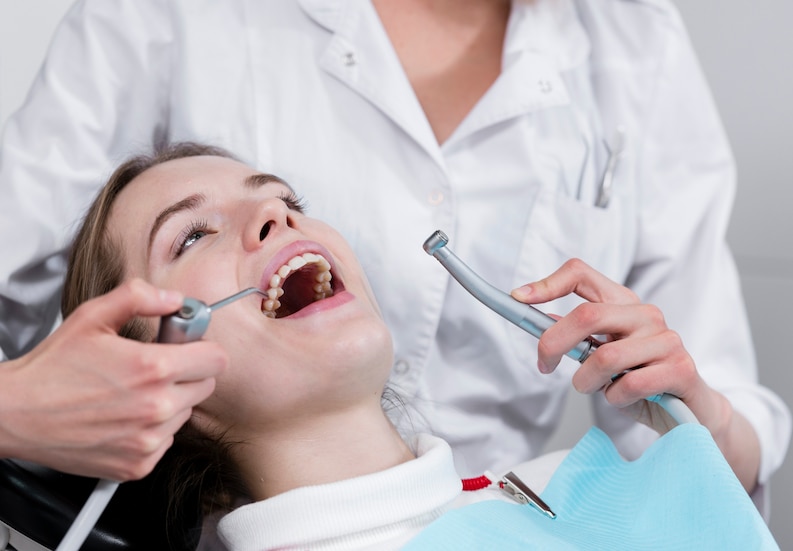We all want a beautiful smile and healthy teeth and gums because it not only makes us look good but also keeps us healthy. Surprisingly, almost half of adults have experienced bad breath, which is also called halitosis. It’s a common dental problem that can be treated. This article talks about bad breath and nine other common dental issues. It explains what causes them and suggests ways to treat them.
- Tooth Decay:Tooth decay, also known as dental caries or cavities, is the most commonly observed dental problem. It occurs when bacteria create a film (plaque) on teeth, producing acids from consumed sugars. These acids damage the enamel, resulting in cavities, toothaches, and discoloration. Dental care involves assessments and treatments such as fillings, crowns, root canals, or extraction. For comprehensive dental solutions, including dental implants in Noida Sector 19, consult with our experienced team.
- Gum Disease: Gingivitis marks the initial stage of gum disease, driven by bacterial plaque buildup. Symptoms include red, swollen gums, bleeding, bad breath, and tooth sensitivity. Factors like poor oral hygiene, crooked teeth, and certain conditions contribute. Regular dental checkups, thorough cleanings, and proper daily care are crucial. If untreated, gingivitis progresses to periodontitis, causing severe complications.
- Bad Breath: Bad breath, or halitosis, is a distrensiing issue with diverse causes such as poor oral hygiene, dry mouth, medications, infections, acid reflux, and certain foods. A comprehensive assessment by a dentist determines an appropriate course of action for each case.
- Sensitive Teeth: Tooth sensitivity arises when the enamel wears away, exposing the dentin layer. This condition, known as dentin hypersensitivity, can result from various factors, including tooth decay, gum disease, root infection, or worn dental work. Specialized toothpaste, fluoride treatments, crowns, gum grafts, or root canals address this issue based on its severity.
- Missing Teeth: Losing a tooth can create a gap in your mouth, affecting how you chew, making other teeth move, and even causing the jawbone to lose strength. Sometimes, teeth can fall out due to accidents or health issues, and it’s important to replace them. This helps with better chewing, stops nearby teeth from shifting around, and keeps the jawbone strong. To fill the gap of a missing tooth, you can choose from options like a partial denture, dental bridge, or dental implant.
- White Spots: Milky-white spots on teeth reveal underlying issues with tooth enamel, serving as early indicators of potential dental problems such as caries or fluorosis. These distinct marks can arise from demineralization due to mineral deficiencies, conditions like Turner’s tooth linked to enamel quality or thickness deficiencies resulting from decay, excessive fluoride intake during formative years (fluoridation), or poor oral hygiene during orthodontic treatment. While these white spots can pose aesthetic concerns, interventions like the use of pastes with milk proteins, teeth whitening, fillings, or dental veneers can effectively address them without compromising overall dental health
- Cracked or Broken Teeth: Injuries, chewing hard foods, mouth piercings, or teeth grinding often lead to cracked or broken teeth. Swift dental examination is essential for suitable treatments like veneers, crowns, or tooth-colored fillings.
- Receding Gums: Receding gums expose tooth roots, increasing the risk of damage or tooth loss. Causes include poor oral hygiene, aggressive tooth brushing, high blood pressure, hormonal changes, smoking, or genetic predisposition. Treatment ranges from professional cleaning to gum grafts or surgery in severe cases.
- Root Infection: Bacterial infections in the tooth’s base or root, typically caused by cavities, cracks, or fractures, lead to chronic throbbing toothaches and sensitivity. A root canal, performed with anesthetic, effectively treats root infections.
- Enamel Erosion: Enamel erosion, resulting from prolonged consumption of sugary and acidic foods or aggressive brushing, leads to discolored and weakened teeth. Prevention involves reducing sugary intake, using softer toothbrushes, and considering dental veneers for cosmetic improvement.
- Dry Mouth:Dry mouth, affecting individuals of any age, can result from various factors, including cancer treatments, salivary gland disease, nerve damage, and certain medications. Managing dry mouth involves staying hydrated, avoiding drying substances, and addressing underlying causes.
- Teeth Grinding (Bruxism): Teeth grinding, occurring during sleep or wakefulness due to factors like stress or abnormal bite, can cause tooth damage, jaw pain, headaches, and earaches. Custom-made mouthguards provided by dentists effectively minimize grinding, offering protection and aiding in bite correction.
Prioritizing regular dental checkups, adopting good oral hygiene practices, and promptly addressing dental concerns contribute significantly to sustaining optimal oral health. If you notice any of the above dental issues, it’s a good idea to quickly talk to the best dentist in Noida. Getting treatment timely helps take care of any issisues fast and well, making you healthier and more confident.




